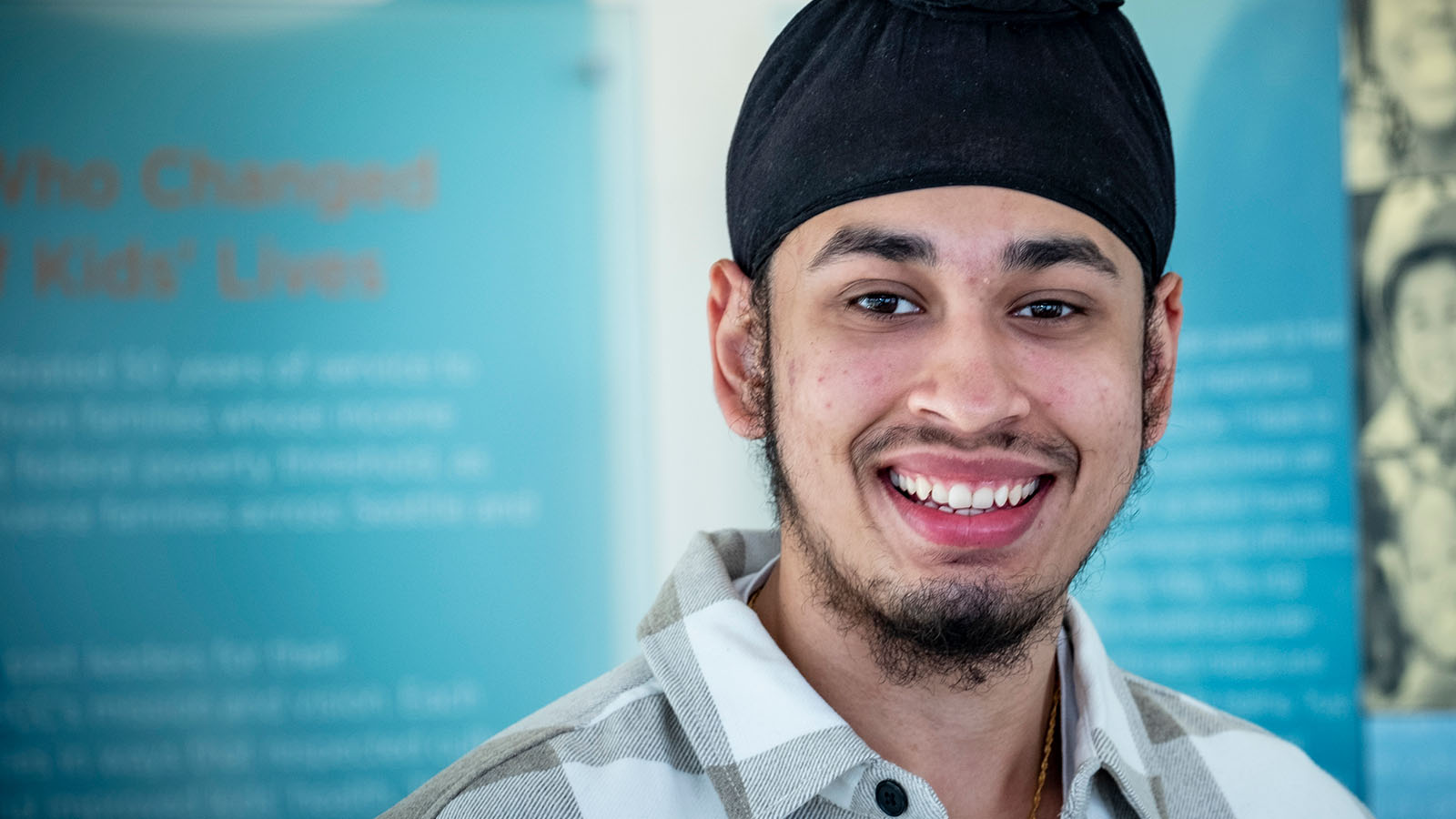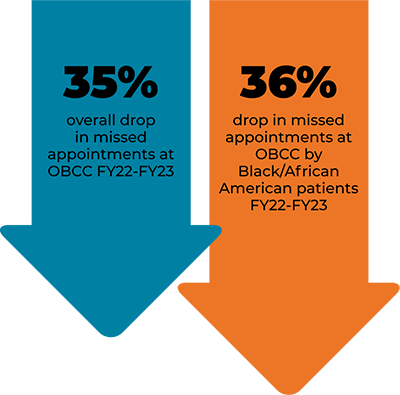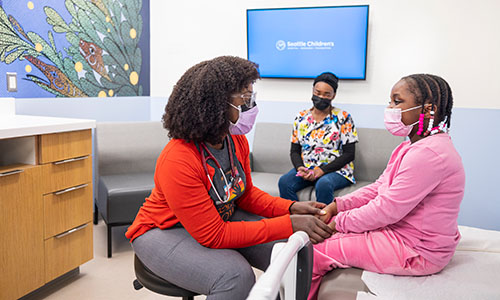Due to a measles case in the community, please call before coming to Seattle Children’s if you or your child has potential measles symptoms.

It’s clear from the muraled walls of Seattle Children's Odessa Brown Children’s Clinic (OBCC) that staff are making a difference in the lives of patients and their families.
 OBCC’s second location opened in Othello in 2022.The new clinic is located near the Othello Link light rail station in Seattle's Rainier Valley neighborhood.
OBCC’s second location opened in Othello in 2022.The new clinic is located near the Othello Link light rail station in Seattle's Rainier Valley neighborhood.With two locations in Seattle’s Central District and Othello neighborhoods, OBCC provides whole-patient care for its patients, including medical, dental, behavioral health, nutrition services and more. The patient population seen at OBCC is diverse, with many patients and their families identifying as Black or African American.
But what if barriers prevent patients from getting to their appointments to start or continue their healing journey? That’s where OBCC’s Missed Appointment team steps in.
The Missed Appointment team works across all departments at OBCC to ensure that even the youngest of patients has a fair chance of being seen by a provider. Since summer 2022, Missed Appointment Coordinator Gurkaran Parhar (Gurk) has been reaching out to families in advance of appointments to confirm the time and date and proactively address barriers to attending appointments in-person and virtually. As the first person to serve in this role, Parhar takes a tailored approach to ensure that every family can get the care they need.
“An automated system sends text messages [to families], and I’ll follow-up with personalized messages, call families, or a parent might call me,” Parhar said. “I use an [online] dashboard to explore the factors that might cause a family to miss their appointments.” Parhar focuses his outreach to families flagged by a computer-generated algorithm that predicts missed appointments.

Daniel Harton, analyst at OBCC who built the models that inform the algorithm explains, “The outcome of the appointment was not directly correlated with any single feature.” There were some factors, however, that consistently showed significant association with a missed appointment. These included prior missed appointments, physical distance from OBCC, whether they have a MyChart account and the month of the appointment, among others.
Race is not a predictive factor of missed appointments in this model, so it’s not a data point that informs Parhar’s outreach.
“It was important to us to not include race as a feature in order to reduce bias and avoid perpetuating systemic discrimination,” shares Harton. “Race itself is not a determining factor. It’s systemic racism and the associated social determinants of health that disproportionately affect racial and ethnic minority groups and can create a web of barriers and challenges.”
While race was not included in the model, Parhar and his team partnered with Seattle Children's Center for Diversity and Health Equity to support patients in overcoming barriers to getting to their appointments. This led to to a 36% reduction in missed appointments by Black and African American patients at OBCC between September 2022 and September 2023.
Patients say they value Parhar for providing additional support.
 OBCC provides whole-patient care for its patients, including medical, dental, behavioral health, nutrition services and more.
OBCC provides whole-patient care for its patients, including medical, dental, behavioral health, nutrition services and more.“[I’m] truly grateful for this resource and making sure that I’m able to get my daughter to her appointments, as that’s one of my main priorities,” said Porshia, the mother of a 7-month-old baby who receives primary care at OBCC.
Preventing missed appointments is a priority that requires commitment and dedication from staff; it’s an effort that cuts across all services offered at OBCC and other departments at Seattle Children’s as well. Clinic staff, nurses and providers all help flag and intervene on the many barriers that might keep patients from making their appointments. Barriers may include difficulties around caregiving, school attendance, work obligations and more.
“This work is preventative, and we do our best to help families,” Parhar said. “If [families] are having transportation problems, the clinic will provide them with ORCA transit gift cards. I’ll check to make sure they have the appropriate tools, like Zoom, to get to their virtual appointments.”
Parhar also helps patients sign up for MyChart, an online tool that allows parents to directly message providers, access lab results, access telehealth appointments, and cancel or reschedule appointments that are no longer needed. “I always mention that it doesn’t hurt to sign up and is something that is very useful to have,” adds Parhar.
 Muraled walls within the two clinic locations welcome patients and families to OBCC for their care. Mural by Addie Boswell.
Muraled walls within the two clinic locations welcome patients and families to OBCC for their care. Mural by Addie Boswell.This work extends beyond ensuring patients make it through the clinic’s doors. If a care team discovers that a family needs groceries, for example, the clinic will provide gift cards for food purchases. This coordination role is one that Parhar is happy to play, especially given his desire to help people. The patients he interacts with say they feel his — and Seattle Children’s — support.
“It’s been so helpful having [Parhar] coordinate rides and communicating ahead of appointments what time I'm getting picked up and dropped off,” says Maty, a 16-year-old patient who works with Parhar regularly to get to her appointments. “Without this resource, I don’t really have an alternative option.”
Before 2022, the overall missed appointment rate trended between 24% and 26%. It’s dropped drastically since then, largely attributed to the creation of Parhar’s position that same year. Today, that rate trends between 16% and 18%.
“Reducing missed appointments is a critical aspect of promoting health equity by ensuring that all individuals, regardless of their background or socioeconomic status, have access to the healthcare services they require,” says Harton. “Addressing these barriers and improving appointment attendance can help narrow disparities. By leveraging artificial intelligence and algorithms to help us predict those at risk of missing their appointment, we can focus our efforts more effectively.”
This type of patient experience transcends one family — it impacts a community.
“When I learn that a family can’t get to an appointment, it opens the door for another patient family to be seen,” Parhar explained. “The wait times can be a month or more, so knowing when another patient can be seen — and helping them get to their appointment — is an important part of our efforts.”
Cover photo: Gurkaran “Gurk” Parhar, Missed Appointment Coordinator with Seattle Children’s